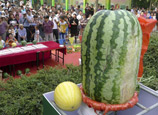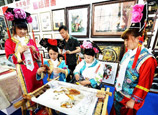
Advancing regulations
On February 21, 2012, the government signaled its concern over bio-engineered corn and rice by drafting the country's first-ever "Grains Law" outlawing production of GM staple foods.
"Neither group nor individual may apply genetically-modified technologies to staple foods," the draft read, indicating though not specifically naming rice, corn and wheat.
Jiang noted the biggest problem surrounding GM foods in China is the "alarming lack of law enforcement."
"Laws and regulations have shown improvement in regards to GM technology, but there's no clear accordance or standards to show how to control GM products," Jiang said.
The Supervision and Testing Center for GM Foods under the Ministry of Agriculture clarified in 2012 that China had neither allowed GM technology to be adopted in staple grains' commercial planting in the country, nor allowed GM seeds imported from other countries to be planted.
Evidence of stricter control over GM grains has emerged in Northeast China's Jilin Province, an important national base of grains, where rice and corn is routinely inspected to ensure GM varieties do not enter the market, according to Jilin agriculture authorities.
Other parts of the country have followed suit with similar campaigns, but transparency remains a key issue, according to Tong Pingya, a leading expert on GM technology at the Chinese Academy of Agricultural Sciences.
"These moves are agricultural authorities' reaction to increasing questions about GM organisms and the global anti-GM trend. Authorities should act on the safety concerns held by the Chinese public, instead of protecting commercial profits yielded by GM crops," Zheng Fengtian, a professor at Renmin University of China's School of Agricultural Economics and Rural Development, told the Global Times.
Zheng said that the Ministry of Agriculture's push for commercialization of GM rice over the last few years had resulted in increasing pressure and questions from the public about the safety and appropriateness of such a transition.
"More research needs to be conducted on GM organisms before putting such products on the market. With more attention from the public and media, greater policy control will be seen in the future," Zheng noted.

















 People cool off in water from orange-coded alert of heat in Chongqing
People cool off in water from orange-coded alert of heat in Chongqing


![]()
